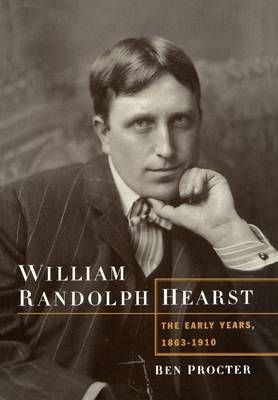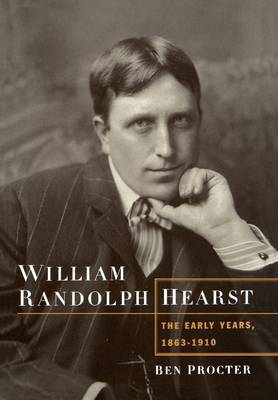
Je cadeautjes zeker op tijd in huis hebben voor de feestdagen? Kom langs in onze winkels en vind het perfecte geschenk!
- Afhalen na 1 uur in een winkel met voorraad
- Gratis thuislevering in België vanaf € 30
- Ruim aanbod met 7 miljoen producten
Je cadeautjes zeker op tijd in huis hebben voor de feestdagen? Kom langs in onze winkels en vind het perfecte geschenk!
- Afhalen na 1 uur in een winkel met voorraad
- Gratis thuislevering in België vanaf € 30
- Ruim aanbod met 7 miljoen producten
Zoeken
€ 111,45
+ 222 punten
Omschrijving
William Randolph Hearst was one of the most colorful and important figures of turn-of-the-century America, a man who changed the face of American journalism and whose influence extends to the present day. Now, in William Randolph Hearst, Ben Procter gives us the most authoritative account of Hearst's extraordinary career in newspapers and politics.
Born to great wealth--his father was a partial owner of four fabulously rich mines--Hearst began his career in his early twenties by revitalizing a rundown newspaper, the San Franciso Examiner. Hearst took what had been a relatively sedate form of communicating information and essentially created the modern tabloid, complete with outrageous headlines, human interest stories, star columnists, comic strips, wide photo coverage, and crusading zeal. His papers fairly bristled with life. By 1910 he had built a newspaper empire--eight papers and two magazines read by nearly three million people. Hearst did much to create "yellow journalism"--with the emphasis on sensationalism and the lowering of journalistic standards. But Procter shows that Hearst's papers were also challenging and innovative and powerful: They exposed corruption, advocated progressive reforms, strongly supported recent immigrants, became a force in the Democratic Party, and helped ignite the Spanish-American War. Procter vividly depicts Hearst's own political career from his 1902 election to Congress to his presidential campaign in 1904 and his bitter defeats in New York's Mayoral and Gubernatorial races.
Written with a broad narrative sweep and based on previously unavailable letters and manuscripts, William Randoph Hearst illuminates the character and era of the man who left an indelible mark on American journalism.
Born to great wealth--his father was a partial owner of four fabulously rich mines--Hearst began his career in his early twenties by revitalizing a rundown newspaper, the San Franciso Examiner. Hearst took what had been a relatively sedate form of communicating information and essentially created the modern tabloid, complete with outrageous headlines, human interest stories, star columnists, comic strips, wide photo coverage, and crusading zeal. His papers fairly bristled with life. By 1910 he had built a newspaper empire--eight papers and two magazines read by nearly three million people. Hearst did much to create "yellow journalism"--with the emphasis on sensationalism and the lowering of journalistic standards. But Procter shows that Hearst's papers were also challenging and innovative and powerful: They exposed corruption, advocated progressive reforms, strongly supported recent immigrants, became a force in the Democratic Party, and helped ignite the Spanish-American War. Procter vividly depicts Hearst's own political career from his 1902 election to Congress to his presidential campaign in 1904 and his bitter defeats in New York's Mayoral and Gubernatorial races.
Written with a broad narrative sweep and based on previously unavailable letters and manuscripts, William Randoph Hearst illuminates the character and era of the man who left an indelible mark on American journalism.
Specificaties
Betrokkenen
- Auteur(s):
- Uitgeverij:
Inhoud
- Aantal bladzijden:
- 384
- Taal:
- Engels
Eigenschappen
- Productcode (EAN):
- 9780195112771
- Verschijningsdatum:
- 16/04/1998
- Uitvoering:
- Hardcover
- Formaat:
- Genaaid
- Afmetingen:
- 168 mm x 243 mm
- Gewicht:
- 689 g

Alleen bij Standaard Boekhandel
+ 222 punten op je klantenkaart van Standaard Boekhandel
Beoordelingen
We publiceren alleen reviews die voldoen aan de voorwaarden voor reviews. Bekijk onze voorwaarden voor reviews.









